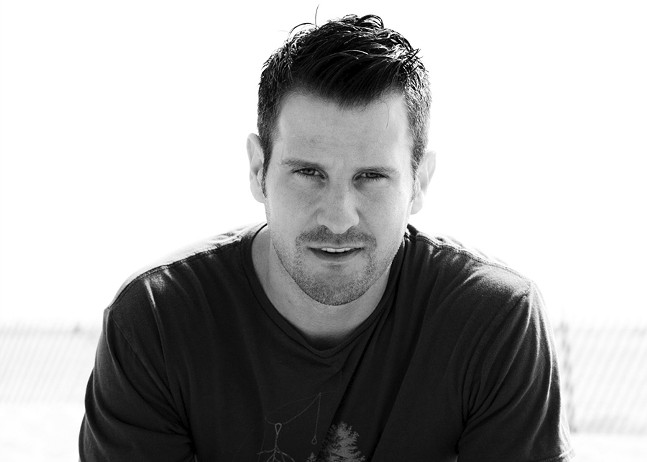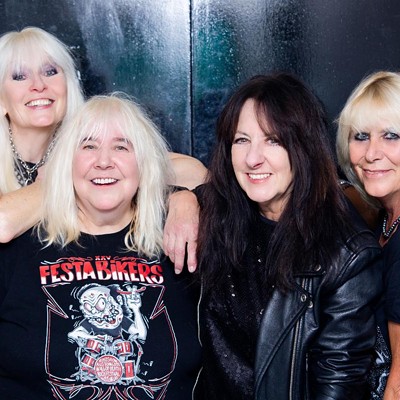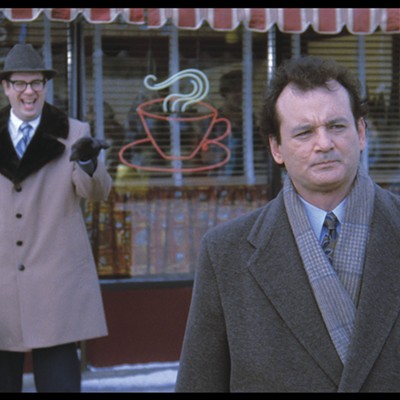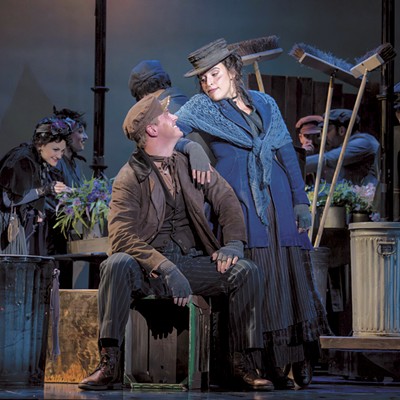Donnie Darko filmmaker Richard Kelly stays writing, weird, and relevant
More than 20 years after its release, Richard Kelly is often asked how Donnie Darko — his 2001 sci-fi film anchored by a six-foot-tall rabbit — got made. On the face of it, it’s an origin story as unusual as the film, where, midway through, Kelly unexpectedly finds himself on the set of Charlie’s Angels.
As a 25-year-old writer-director trying to pitch the bold debut feature, set around Halloween in 1988, Kelly tells Pittsburgh City Paper in a phone interview, “the consensus was [it was] a great writing sample, [but] I was too young and inexperienced.”
“[They said] I should sell the script, let them rewrite it into a horror film, make it contemporary, and let someone else direct it,” he says of Donnie Darko, now considered a cult classic.
Kelly visits Pittsburgh on Sat., Oct. 21 for a double feature of Donnie Darko and the "Cannes Cut" of his second film, Southland Tales. The movies will screen at the Hollywood Theater in Dormont — recently taken over by Row House Cinema — followed by a Q&A with Kelly and a performance by singer Rebekah Del Rio.
On the heels of this summer’s “Barbenheimer” phenomenon — in what some called a new season for auteurs — it seems timely to revisit Kelly’s work, which has long resisted convention.
"I[‘ve] tried to stick to who I am and do these kinds of really complicated films that are not easy to get made and not easy to digest in one viewing,” Kelly says. “I've had many opportunities to do kind a very straight down the middle genre film … and I've said no, very politely I hope.”
A lucky break came when Jason Schwartzman, then the rising star of Rushmore, got a hold of the script. Schwartzman — originally attached to play the title role — passed it to Drew Barrymore’s producing partner. Suddenly, Kelly was invited to Barrymore’s trailer on the Charlie’s Angels set, where they talked over a budget with her production company. Barrymore ended up playing the movie’s sage English teacher. (Reflecting, Kelly realizes “technically, I've worked with all three of Charlie’s Angels and what a thrill that has been.”)
The origins of Donnie Darko seem less strange, Kelly says, when you consider how much of moviemaking comes down to “a sort of musical chairs … follow[ing] the movie gods and the weather.” But a tale of Hollywood kismet and surreal contrasts seems fitting for Darko — and one could just as easily imagine a world where the film was never made, or where it’s a mainstream contemporary horror flick (in the movie, a duplicate universe exists just beyond our comprehension).
In contrast to brooding teenager Donnie Darko (whom actor Jake Gyllenhaal said he performed as an imitation of Kelly) or to any auteur persona, Kelly, now 48, comes across exceedingly pleasant and self-possessed.
“I know how lucky I am, and I don’t take that for granted,” he says. “I’m from Virginia, you know? My mom was a public school teacher. My dad worked for NASA.” (These autobiographical details feature heavily in his third film, the 2009 release The Box).
At the same time, “I’m such a control freak as a director,” Kelly says. “I’m an Aries. I love being collaborative and having great artistic partners, but I’m not really that sort of hired hand kind of guy … I need to have my fingerprints on everything.”
Perhaps it’s this same quality of self possession that led to Southland Tales, Kelly’s 2006 sophomore film still widely thought to be, as one reporter put it, “one of the most ambitious, spectacular, and commercially disastrous oddities in Hollywood history.” For those unfamiliar, the nearly three-hour movie is: set in the near future of 2008; begins with found footage of a nuclear attack; stars Dwayne Johnson as a prophetic action star, alongside Sarah Michelle Gellar, Mandy Moore, and Justin Timberlake, who plays an Iraq War veteran; sends up the Patriot Act, military-industrial complex, infotainment, celebrity culture, and climate change mitigation; and has a plot point involving a rip in the fabric of spacetime.
Since its release 17 years ago, the movie has been the subject of a Salon explainer (“It's OK to be confused by Richard Kelly’s Southland Tales,” it begins) and a 6,000-word deep dive (now on Vice) in which the reporter is so intrigued that she seeks out Kelly and goes through the movie point by point with him. A City Paper review called Southland Tales “a heady, dystopic epic/satire about nuclear war” (there’s also a musical element) that is “lousy with ambition and verve, but tough to follow.”
It’s possible the film’s expansiveness can be chalked up to this: Kelly says there are few things he loves as much as world building. He considers all three of his films to be unfinished — “I so wish that I had more movies to screen, I really do,” he says — but none, he stresses, more than Southland Tales. Originally based on a series of graphic novels he wrote, Kelly imagines an “improved screenplay” that would allow him to shoot new sequences, some animated, and add more advanced visual effects.
“Even if I’m in a nursing home one day and I’m just supervising some sort of virtual reality animation for it, to finally finish Southland Tales, that’s my bucket list goal,” Kelly says. “I joked one day that I [could do] it with sock puppets.”
This year, Kelly has been touring with his films, re-engaging with audiences for the first time in awhile. The Fluid Karma tour — named after the inexhaustible, ocean-powered energy source in Southland Tales — is in large part a response to work stoppages caused by the SAG-AFTRA strike.
But it also comes at the urging of Kelly’s longtime collaborator Rebekah Del Rio, who sings a bilingual version of the "Star Spangled Banner" in Southland Tales (though she may be better known from David Lynch’s Mulholland Drive). Del Rio brought Kelly to independent cinemas like the historic Hollywood Theater, reconnecting him with film fans.
“I love these old theaters,” Kelly says. “I’m so grateful … because I feel like an angel gets its wings every time an old theater gets restored.”
On tour he says, “there's been a lot of talk of revisiting my first two films,” and with time, they may have grown more resonant. Southland Tales in particular has been described as a dispatch from the future. (One line from the film — also in Kelly’s Twitter bio — is “Scientists are saying the future will be far more futuristic than they originally predicted.”) Kelly speculates that “with each passing year, it just seems like the craziness knob got turned a little faster since we made the film … the world kind of caught up to the film.” The 2016 presidential election in particular represented “a moment of a seismic shift, one of many seismic shifts,” Kelly says.
The reappraisal and renewed interest is gratifying for Kelly, who says gives him an "increased sense of commitment wanting to expand upon the film."
“These screenings are more than anything for me kind of a mechanism to try and achieve that," he adds.
As for future projects? Kelly, as his fans know, is a devotee of classic literature (see if you catch the T.S. Eliot and Andy Warhol references), and, here, the famous Mark Twain aphorism comes to mind: Reports of his demise have been greatly exaggerated. Kelly stays “writing and writing and writing.”
“I'm one of those people that likes to keep forging ahead, hoping that one day the floodgates will finally open and I'll be in a river flowing finally in the direction I want to go,” he says. “To make a water metaphor out of it,” he adds with a laugh.
Fluid Karma Double Feature with director Richard Kelly. 5 p.m. Sat., Oct. 21. Row House Hollywood. 1449 Potomac Ave., Dormont. $28. rowhousecinemas.com/hollywood
As a 25-year-old writer-director trying to pitch the bold debut feature, set around Halloween in 1988, Kelly tells Pittsburgh City Paper in a phone interview, “the consensus was [it was] a great writing sample, [but] I was too young and inexperienced.”
“[They said] I should sell the script, let them rewrite it into a horror film, make it contemporary, and let someone else direct it,” he says of Donnie Darko, now considered a cult classic.
Kelly visits Pittsburgh on Sat., Oct. 21 for a double feature of Donnie Darko and the "Cannes Cut" of his second film, Southland Tales. The movies will screen at the Hollywood Theater in Dormont — recently taken over by Row House Cinema — followed by a Q&A with Kelly and a performance by singer Rebekah Del Rio.
On the heels of this summer’s “Barbenheimer” phenomenon — in what some called a new season for auteurs — it seems timely to revisit Kelly’s work, which has long resisted convention.
"I[‘ve] tried to stick to who I am and do these kinds of really complicated films that are not easy to get made and not easy to digest in one viewing,” Kelly says. “I've had many opportunities to do kind a very straight down the middle genre film … and I've said no, very politely I hope.”
A lucky break came when Jason Schwartzman, then the rising star of Rushmore, got a hold of the script. Schwartzman — originally attached to play the title role — passed it to Drew Barrymore’s producing partner. Suddenly, Kelly was invited to Barrymore’s trailer on the Charlie’s Angels set, where they talked over a budget with her production company. Barrymore ended up playing the movie’s sage English teacher. (Reflecting, Kelly realizes “technically, I've worked with all three of Charlie’s Angels and what a thrill that has been.”)
The origins of Donnie Darko seem less strange, Kelly says, when you consider how much of moviemaking comes down to “a sort of musical chairs … follow[ing] the movie gods and the weather.” But a tale of Hollywood kismet and surreal contrasts seems fitting for Darko — and one could just as easily imagine a world where the film was never made, or where it’s a mainstream contemporary horror flick (in the movie, a duplicate universe exists just beyond our comprehension).
In contrast to brooding teenager Donnie Darko (whom actor Jake Gyllenhaal said he performed as an imitation of Kelly) or to any auteur persona, Kelly, now 48, comes across exceedingly pleasant and self-possessed.
“I know how lucky I am, and I don’t take that for granted,” he says. “I’m from Virginia, you know? My mom was a public school teacher. My dad worked for NASA.” (These autobiographical details feature heavily in his third film, the 2009 release The Box).
At the same time, “I’m such a control freak as a director,” Kelly says. “I’m an Aries. I love being collaborative and having great artistic partners, but I’m not really that sort of hired hand kind of guy … I need to have my fingerprints on everything.”
Perhaps it’s this same quality of self possession that led to Southland Tales, Kelly’s 2006 sophomore film still widely thought to be, as one reporter put it, “one of the most ambitious, spectacular, and commercially disastrous oddities in Hollywood history.” For those unfamiliar, the nearly three-hour movie is: set in the near future of 2008; begins with found footage of a nuclear attack; stars Dwayne Johnson as a prophetic action star, alongside Sarah Michelle Gellar, Mandy Moore, and Justin Timberlake, who plays an Iraq War veteran; sends up the Patriot Act, military-industrial complex, infotainment, celebrity culture, and climate change mitigation; and has a plot point involving a rip in the fabric of spacetime.
Since its release 17 years ago, the movie has been the subject of a Salon explainer (“It's OK to be confused by Richard Kelly’s Southland Tales,” it begins) and a 6,000-word deep dive (now on Vice) in which the reporter is so intrigued that she seeks out Kelly and goes through the movie point by point with him. A City Paper review called Southland Tales “a heady, dystopic epic/satire about nuclear war” (there’s also a musical element) that is “lousy with ambition and verve, but tough to follow.”
It’s possible the film’s expansiveness can be chalked up to this: Kelly says there are few things he loves as much as world building. He considers all three of his films to be unfinished — “I so wish that I had more movies to screen, I really do,” he says — but none, he stresses, more than Southland Tales. Originally based on a series of graphic novels he wrote, Kelly imagines an “improved screenplay” that would allow him to shoot new sequences, some animated, and add more advanced visual effects.
“Even if I’m in a nursing home one day and I’m just supervising some sort of virtual reality animation for it, to finally finish Southland Tales, that’s my bucket list goal,” Kelly says. “I joked one day that I [could do] it with sock puppets.”
This year, Kelly has been touring with his films, re-engaging with audiences for the first time in awhile. The Fluid Karma tour — named after the inexhaustible, ocean-powered energy source in Southland Tales — is in large part a response to work stoppages caused by the SAG-AFTRA strike.
But it also comes at the urging of Kelly’s longtime collaborator Rebekah Del Rio, who sings a bilingual version of the "Star Spangled Banner" in Southland Tales (though she may be better known from David Lynch’s Mulholland Drive). Del Rio brought Kelly to independent cinemas like the historic Hollywood Theater, reconnecting him with film fans.
“I love these old theaters,” Kelly says. “I’m so grateful … because I feel like an angel gets its wings every time an old theater gets restored.”
On tour he says, “there's been a lot of talk of revisiting my first two films,” and with time, they may have grown more resonant. Southland Tales in particular has been described as a dispatch from the future. (One line from the film — also in Kelly’s Twitter bio — is “Scientists are saying the future will be far more futuristic than they originally predicted.”) Kelly speculates that “with each passing year, it just seems like the craziness knob got turned a little faster since we made the film … the world kind of caught up to the film.” The 2016 presidential election in particular represented “a moment of a seismic shift, one of many seismic shifts,” Kelly says.
The reappraisal and renewed interest is gratifying for Kelly, who says gives him an "increased sense of commitment wanting to expand upon the film."
“These screenings are more than anything for me kind of a mechanism to try and achieve that," he adds.
As for future projects? Kelly, as his fans know, is a devotee of classic literature (see if you catch the T.S. Eliot and Andy Warhol references), and, here, the famous Mark Twain aphorism comes to mind: Reports of his demise have been greatly exaggerated. Kelly stays “writing and writing and writing.”
“I'm one of those people that likes to keep forging ahead, hoping that one day the floodgates will finally open and I'll be in a river flowing finally in the direction I want to go,” he says. “To make a water metaphor out of it,” he adds with a laugh.
Fluid Karma Double Feature with director Richard Kelly. 5 p.m. Sat., Oct. 21. Row House Hollywood. 1449 Potomac Ave., Dormont. $28. rowhousecinemas.com/hollywood



















